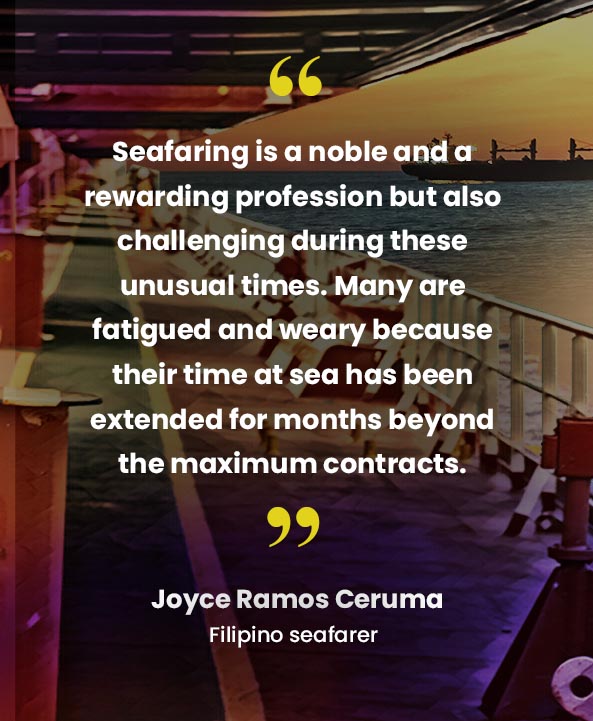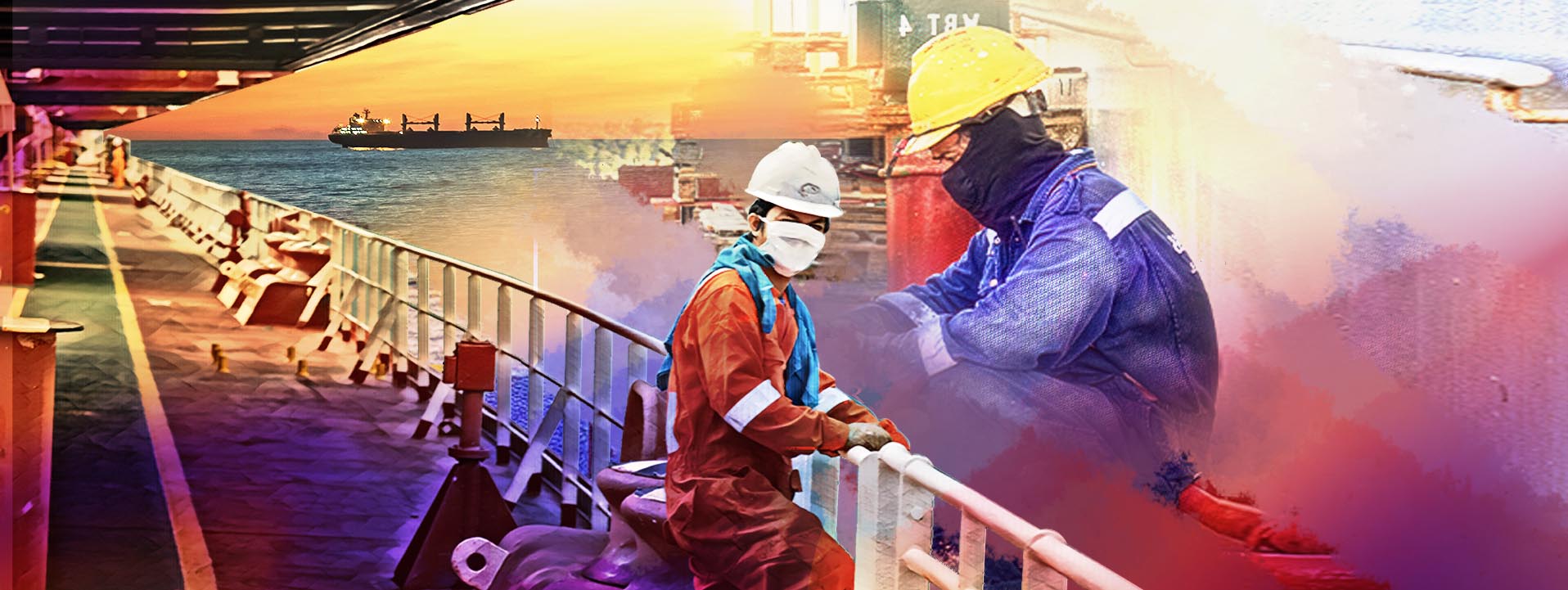When the busiest cities around the world were being put under lockdown and people were asked to stay home to beat COVID-19, Vivin Rohan Shiri was at sea with no guarantee of when he was going to get back.
“For the first few months, it was business as usual. There was certainty—I knew I would be back home in nine months,” he said. “But we did not think COVID would happen.”
Shiri signed a nine-month contract with Danish shipping giant Maersk to sail aboard the cargo ship Maersk Taikung. On November 9, 2019, he boarded from his hometown Mumbai—the financial capital of India and the country’s biggest port city. He was to return to the same port nine months later, but COVID-19 would ruin those plans.
In March, when the spread of COVID-19 became evidently global, shipping routes all over the world were thrown out of gear. Ships were diverted from ports. Most seafarers had no idea when they would be allowed to go home. On land, giant economies were brought to a grinding halt to save lives.
On sea, however, keeping the global economy afloat took precedence over protecting the human rights of seafarers.
Systemic racism
Across the globe there are currently around 400,000 seafarers on the high seas who are unable to get back home to their families due to the pandemic.
These seafarers “have been at sea for 17 months without a break, well beyond the 11-month limit set out in the Maritime Labour Convention (MLC), the International Maritime Organization (IMO) reported in September. Another 400,000 “are unable to join ships,” IMO added.
“Overly fatigued and mentally exhausted seafarers are being asked to continue to operate ships,” said IMO Secretary-Generaly Kitack Lim in a statement.
In what reflects the systemic racism in the global shipping industry, the bulk of seafarers stuck on ships are from developing Asian countries. The fact that Asian economies offer cheap labor to western shipping giants means Asians and other people of color are overrepresented in low-paying seafaring jobs.
The Seafarers Happiness Index released by The Mission to Seafarers early this year highlights issues of racism and other concerns such as “a lack of shore leave to relieve stress.”
Of the 400,000 seafarers “currently impacted by COVID restrictions, the majority are from the Global South: [the] Philippines, China, India, and Indonesia,” said Katie Higginbottom, head of the ITF Seafarers Trust, a global charity based in the United Kingdom that works for the well-being of maritime workers, seafarers, and their families.
“There is some movement on crew change but the number over contract is massive.”
One sailor’s lament
The term ‘over contract’ refers to sailors like Shiri who sailed for far longer than their original contracts stipulated. Shiri’s contract was supposed to have ended in August 2020. But it was not until the first week of November that he was finally able to set foot on solid ground and make it back home to Mumbai.
But his journey was full of twists and turns. In July, his ship docked near Hong Kong. When the first opportunity came for people to sign off, those who had been on the ship longer got to get off first.
Armanath Ram, Shiri’s crewmate, was among the first to deboard. “As a seafarer, it’s a harsh situation [to be] working in this pandemic. [The] whole world was locked down [and] we are still moving. We can’t make an excuse, because we know our role and how important we are [to] the world economy,” he said.
Meanwhile, uncertainty still loomed for Shiri. Being away from his family had been rough, but it helped to share that experience with so many of his friends. He described his crewmates as a “family away from family” and said it was hard to say goodbye to them. “I knew I was going to over contract. What hurt me more was seeing so many of my friends leave. But I was also very happy for them.”
On September 29, when the ship returned to Hong Kong, Shiri finally got his chance. “I was excited and started to pack my bags,” he said. But the ship had arrived early and the flight carrying the replacement crew had been delayed. They were only allowed to dock in Hong Kong for a limited time.
The vessel Maersk Taikung then set sail for Africa. On October 24, somewhere on the Indian Ocean during the voyage to Africa, Shiri found out that his 69-year-old mother had tested positive for COVID-19. Desperate and anxious to get home, he realized that he would miss his second chance as well. They wouldn’t reach Mauritius for another two days, but the weekly flight out of Port Louis, the capital city, was leaving in a few hours. For a second time on his voyage, Shiri would be denied the chance to get back home.
When they did reach Mauritius, he decided to soldier on and see the voyage to its end. “I thought to myself, my mother is a strong woman. When I was young, my father worked overseas. She could take care of herself. Besides, my father, brother and sister-in-law were with her.”
On November 4, he finally succeeded in signing off in Durban, South Africa. On November 6, his flight from Durban touched down in Mumbai. After seven days in quarantine, he was reunited with his family on November 13. His nine-month contract turned into a 12-month ordeal.
Seafarers: Not essential workers?
Veteran Indian sailor Anoop Kumar Vasvani, 67, is also among the hundreds of thousands who went over contract in the year of the pandemic. His five-month contract got stretched to nine. “I was lucky because my company showed empathy,” he said.
“But not all shipping companies are like that. Some companies keep their employees in the dark about changes in shipping routes and keep them guessing about when their sign-off will be. I have friends who’ve been sailing for over a year now and they have no idea when they will be back.”
Higginbottom of the ITF Seafarers Trust said governments have refused to recognize seafarers as essential workers and profit has taken precedence over their fundamental rights.
“The charterers are not making it any easier by limiting diversions that would facilitate repatriation, because they want to keep their commercial deadlines and don’t consider the human rights of seafarers,” she said.
“Still countries have not recognized them as essential workers, which does not help. All this leads to unbearable mental strain as well as fatigue that could result in accidents. It’s a ticking time bomb.”
To this day, most countries refuse to recognize seafarers as essential workers.
United Nations Secretary-General António Guterres has previously called for the formal designation of seafarers as “key workers” to facilitate the repatriation of the fatigued ones among them and their replacement by those awaiting deployment.
The mental strain—that fatigue that Higginbottom spoke about—has been shared by seafarers across nationalities. Filipino seafarer Kelly Secreterio spent more than 14 months on board. “Celebrating my birthday for the second time on board [was] exhausting,” she said.
Joyce Ramos Ceruma, also a Filipino who works on a cruise liner, knows only too well the predicament faced by those who have exceeded their contracts.
“Seafaring is a noble and a rewarding profession but also challenging during these unusual times. Many are fatigued and weary because their time at sea has been extended for months beyond the maximum contracts,” she said.
The situation of seafarers has now started to garner international attention. On November 27, the IMO held its 107th session virtually. IMO Secretary-General Kitack Lim said the focus of that IMO session would be on seafarers stranded across the world due to COVID-19.
“As I have repeatedly emphasized, seafarers are the silent heroes and collateral victims of the COVID-19 pandemic, as travel restrictions have left hundreds of thousands of them stranded on ships, or unable to join ships,” Lim said.
“IMO, together with other United Nations system organizations, has taken countless actions to address the serious issues that have arisen during this crew change crisis, and we will continue to seek solutions to put an end to the crisis,” he assured.
Meanwhile in Mumbai, Shiri is preparing for a quiet Christmas. He said he and his family are glad that he’s home. “I’m a Christian, so it means everything that I got home well in time for Christmas.” ●
Uday Rana is a freelance journalist and writer based in New Delhi, India. Follow him on Twitter @UdaySRana.

















